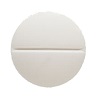Lithium

Lithium 300 mg
| Package | Price | Per pill | Save | Order |
|---|---|---|---|---|
|
360 pills - 300 mg |
$213.11 | $0.59 | $92.85 | Buy now! |
|
270 pills - 300 mg |
$168.01 | $0.62 | $61.46 | Buy now! |
|
180 pills - 300 mg |
$121.59 | $0.68 | $31.39 | Buy now! |
|
90 pills - 300 mg |
$76.49 | $0.86 | No | Buy now! |
Drug Name
Lithium Carbonate
Drug Uses
Lithium Carbonate is use for the treatment of manic depressive illness in which a person experiences fluctuating mood swings from depression to excitement. Manic depression includes symptoms like Aggressiveness, elation, talking fast and urgently, grandiose unrealistic ideas, lack of sleep, hostility, lack of judgement.
How it is taken
Lithum Carbonate can be taken by mouth with food or just after having food to avoid an upset stomach. Increase your fluid intake and have a balanced diet with lots of fluids and salt in it. If you sweat a lot or have diarrhea, then ensure that you get extra liquids and salt.
Drug Class & Mechanism
Lithium Carbonate is an antimanic agent that works by altering the working of certain chemicals in the brain.
Missed Dosage
If you miss a dose of Lithium Carbonate then you may take it as soon as you remember and adjust the remaining doses accordingly. However, if it is nearly time for the next dose then you may skip this dose and continue with the regular dosage. Do not take a double dose to make up for the missed dose.
Storage
Store it at room temperature (between 68 and 77 degrees F (20 and 25 degrees C) in an air tight container protecting it from direct exposure to light, heat and moisture. Keep away from pets and children.
Warnings/Precautions
Discuss with your doctor about any prior medical condition that you may have including allergies to medicines, food or other substances.
Lithium Carbonate may cause drowsiness. These effects get aggravated if you take it with alcohol or certain other medications (sleep aids, muscle relaxers). So, do not drive or perform other potentially hazardous tasks until you know how your body reacts to the drug.
Fever, infection, vomiting, diarrhea, or excessive sweating may lead to an increased loss of salt and electrolytes. Talk to your doctor about replacing the salts in your body.
You must not take if you are allergic to any ingredient in it or have moderate to severe kidney, heart, or blood vessel problems, have low blood sodium levels, are severely dehydrated, ill, or weakened, are taking an angiotensin-converting enzyme (ACE) inhibitor (e.g., enalapril) or a diuretic (e.g., furosemide, hydrochlorothiazide).
If you are pregnant or suspect that you are, then stop using Lithium Carbonate and contact your doctor immediately.
It is unknown whether Lithium Carbonate is secreted in breast milk. Avoid breast feeding while using the drug.
If your doctor has prescribed a potassium supplement to you, then keep taking it according to the prescribed dosage.
Lithium Carbonate should not be used in children younger than 12 years of age as the safety and effectiveness of the drug have not been confirmed yet.
Ensure that you inform your doctor and your dentist about Lithium Carbonate before receiving any form of medical treatment or dental treatment or emergency surgery.
Periodic lab tests including blood lithium levels and kidney function tests may be recommended to monitor your health while taking the drug. Ensure that you do not miss any lab tests.
It has been noted that elder patients are more sensitive to the side effects of the drug. They might need a dosage adjustment or special monitoring throughout the treatment.
Possible Side Effects
Some of the common side effects of are mild hand tremor, mild thirst, temporary, mild nausea and general discomfort at the beginning of treatment. Please contact your doctor if the symptoms persist or become bothersome.
Other severe side effects include allergic reactions severe allergic reactions (rash, hives, itching, difficulty breathing, tightness in the chest, swelling of the mouth, face, lips, or tongue), blurred vision, confusion, diarrhea, drowsiness, excessive weight gain, fainting, giddiness, inability to control the bladder or bowels, increased thirst, increased or decreased urination, involuntary twitching or muscle movements, loss of consciousness, loss of coordination, muscle weakness, persistent headache, persistent or severe nausea, ringing in the ears, seizures, slow or irregular heartbeat, slurred speech, swelling of the ankles or wrists, unsteadiness, vision changes, vomiting.
You must seek medical attention immediately if any of these side effects occur.























